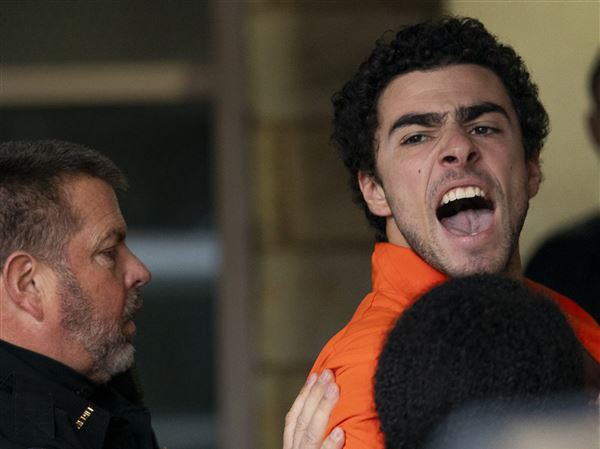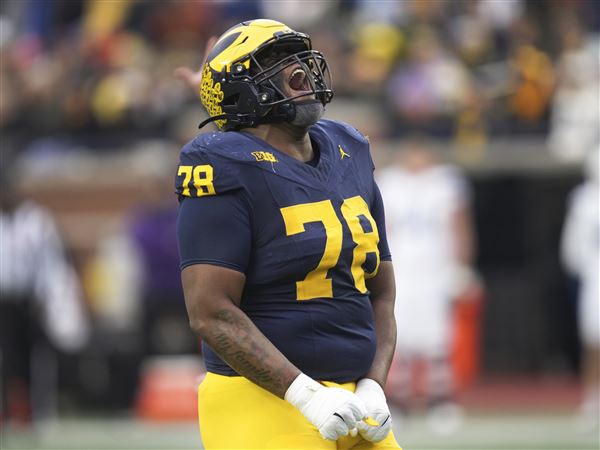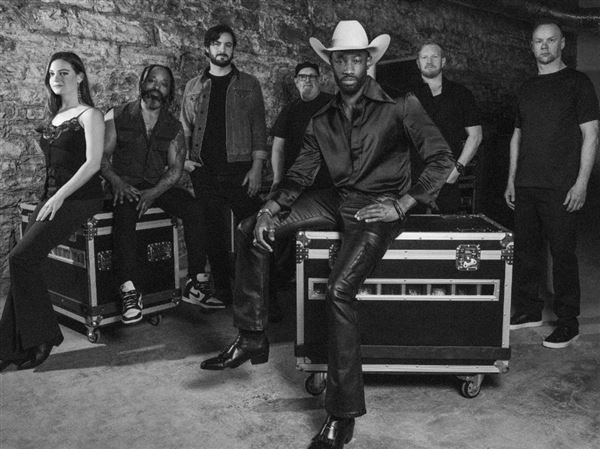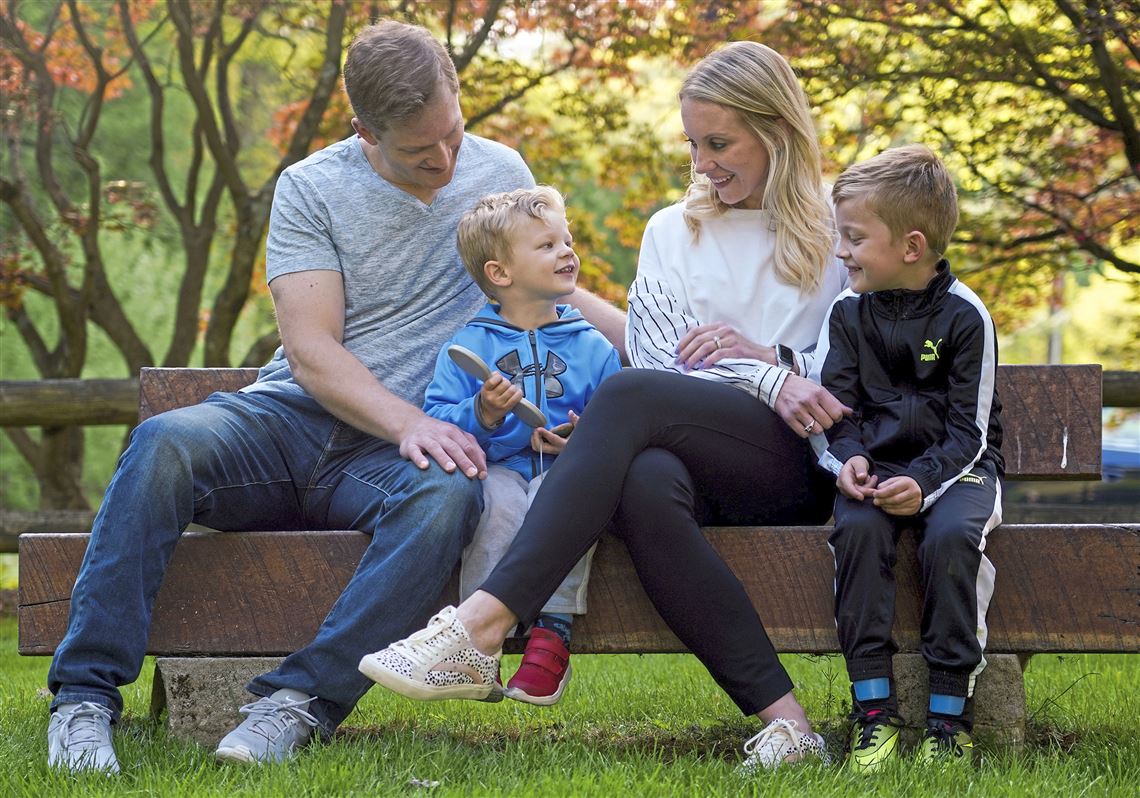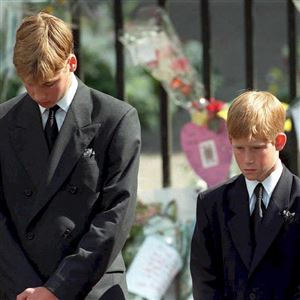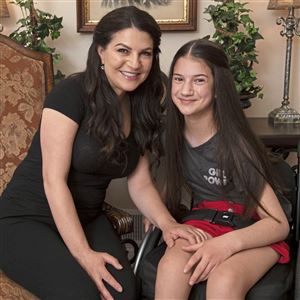sitting on her couch, with Thursday Night Football on television, Pittsburgh Steelers team reporter Missi Matthews weighed the pros and cons of speaking her mind.
It was Sept. 10, 2020, the same day Dallas Cowboys quarterback Dak Prescott opened up about his personal struggles with anxiety and depression. But it was Fox Sports commentator Skip Bayless’ tweet, insinuating that Mr. Prescott’s admission was a sign of weakness, that “triggered” her.
“What Dak did was so brave,” she said. “Anyone who’s able to say, ‘I have a therapist,’ ‘I’ve had to ask for help before,’ ‘I’m not OK’ — to me, that’s so brave and a really hard thing to say out loud.”
She considered sharing her own battle for mental health. But like anyone would be — especially someone in the public eye — she was worried about being judged. “It’s that internal battle: It’s me versus me,” she said in an interview with the Post-Gazette at the North Shore’s Riverfront Park. “If you say it, you kill the shame, but will you have the courage to do it?”
Sitting alone on that September night, seeking no one else’s opinion first, she typed, “I started seeing a therapist last fall for something way less traumatic than what Dak is dealing with. All day I’ve tried to come up with the courage to say this, so I can’t imagine the strength it took for him to speak up. #MentalHealthAwareness” She hit send, flipped her phone screen-side down and laid it on the couch — the end of the internal debate she’d officiated all day.
Close friend, “second therapist,” fellow Steelers reporter and assistant editor of Steelers Digest Teresa Varley remembers seeing the tweet and immediately tearing up.
“I was so impressed,” she said. “That’s one of the biggest steps you can take, I think, when you’re battling something, is to put it out there because it’s so personal.”
Ms. Matthews, 36, — a 2019 Mid-Atlantic Regional Emmy Award winner — says she spoke out on behalf of “me the person, not me the reporter,” but it’s her notoriety that gave her admission an audience. When she picked her phone back up, the responses to her tweet were all thank-you’s and me too’s, which let her know she made the right decision.
“I slept really well that night.”
Dancing machine
Ms. Matthews' relationship with sports began with dance. Like so many 3-year-old girls, she strapped on tap and ballet shoes and the occasional glitzy costume. But she was an especially gifted dancer, which quickly led her to to a high-level training program. Etiquette, posture, public speaking and voice lessons were required components of her dance company’s curriculum. Though she loved other sports — being raised in a family with multiple former University of Pittsburgh athletes — company rules required her to focus solely on dance. She was “obsessed with it, in a good way,” as she’d travel to competitions in places such as Las Vegas and Orlando.
When certain girls were weighed at practices, no one thought much of it. Looking back, her dad, Jeff Matthews, says, “Shame on me and other parents for thinking that was acceptable.”
As she hit high school, the rigors of her dance life became stifling. She wished to have friends outside of dance and run hurdles for the Plum High School track team. With her parents’ support, she quit dance “cold turkey.” Cheerleading, bonfires and movie nights thrilled her at first, but the precipitous change of pace to “normal high school life” was more of an adjustment than she expected.
Her dad, a former Pitt football player, remembers the first sign that something was amiss. He received a call from the school nurse during his daughter’s freshman year: She’d fainted in class. Later that night, she admitted that she hadn’t eaten all day. Mr. Matthews had learned about eating disorders when a co-worker at his insurance firm developed one years before. He began noticing some of those same behaviors in his daughter. Frequent “checking-ins” between father and daughter mostly kept her obsessive tendencies — restricting food and and over-exercising — at bay during high school. But college presented a new challenge.
Though her parents made her apply to other schools, they all knew she’d end up at Pitt like so many in her family had. She joined the Dance Team to reconnect with her love for the sport and majored in media communications — both of which gave her glimpses into the career she’d eventually pursue. But she fell into old habits. She’d look in the mirror and critique her body. She’d dwell on food choices. And she’d slip exercise into every task she could, such as insisting on using a push mower to cut her parents’ grass.
Mr. Matthews educated himself again, and “strongly suggested” — maybe demanded — that his daughter seek outpatient help at UPMC Western Psychiatric Institute’s Center for Eating Disorders. “I was just so embarrassed that I didn’t have it all together,” she said. She remembers taking back ways to the Oakland hospital for therapy appointments, so no one she knew would see her. She resisted the program’s teachings at first, calling herself a “snooty little brat,” in retrospect. Eventually something clicked, but she couldn’t shake her self-consciousness that something with the word “psych” in it was necessary.
As a college intern at then Fox Sports Network, she occasionally missed work because of therapy or a particularly troublesome day mentally. Rather than being honest, she acted like she forgot her schedule, which she knew sent the wrong message about her work ethic. Looking back, she’s frustrated with her younger self. “Why? Why didn’t I just tell people?”
Veteran presence
With a career in sports broadcasting in her sights, she spent the last 1½ years at Pitt working part-time at WTAE — a daunting 3 a.m. until noon shift — which is how longtime WTAE anchor and “Black & Gold Primetime” host Sally Wiggin got to know her.
“It didn’t take more than talking to her a couple of times to know she was special,” Ms. Wiggin said. “You can fake knowing about sports if you read and memorize. What made her special was she knew the game, not just the players. She knew the intricacies of the game and strategy.”
Next she did a two-year reporter/producer gig at WJAC in Johnstown, where the sports director — who knew she “really didn’t want to be covering fires” — offered to help her practice sports reporting and reading from an “old school,” foot-operated teleprompter during his breaks. Her tenacity led to more sports opportunities at the station, followed by an offer in a larger market, Fox 43 in Harrisburg. There, she covered the state Capitol, high school football on Fridays and “unfortunately,” says the Pitt alum, a lot of Penn State sports.
In 2011 — the same year the Steelers went to Super Bowl XLV — she begged the station to cover the AFC championship game in Pittsburgh, offering to save the station money by staying at her parents’ house. She remembers thinking, “I’m in my home town and I’m covering the AFC championship game. How cool is this?”
Meantime, she reunited at a neighborhood party with Brad, a guy she’d known since age 5. Her parents’ neighbors and best friends are his aunt and uncle — all Penn State fans, which gets tricky for a Pitt family — and for some reason, they hit it off. With their wedding on the horizon, Ms. Matthews chose to move back to Pittsburgh while again working for WTAE, until she learned of and took a team reporter position with the Steelers in July 2012.
“It’s a full-time job. It’s 365. I don’t think a lot of people understand that,” she said, just days after the 2021 NFL draft, which she, and many others in the organization, started preparing for as soon as the regular season ended. “The grind always exists. It’s just different depending on the time of year.”
While talking on the North Shore in early May, Ms. Matthews smiled as she realized how many aspects of her early life have woven together in her current role.
Speaking from the diaphragm, enunciating, knowing the proper use of each utensil at a fine dining place setting, hair styling — and being a lifelong Steelers fan — have all come into play as she interviews players for Steelers.com, appears live on KDKA’s pre- and postgame shows, delivers the audio portion of interviews for WDVE and attends Steelers functions.
But some of the insecurities have followed her, too.
While pregnant with her two sons — Matthew, 6, and Justin, 2 — she found it “very difficult” to adjust to her changing body. When on camera, she asked to sit behind a desk or be framed differently to hide her torso, not because she feared for any negative consequences professionally but because she was uncomfortable with the new shape of her body. “I just wanted the babies to be healthy,” and they were, “but at the same time, you’re just screaming in your own skin,” she said with her voice shaking. She has “no pictures” of herself while pregnant, but she “freaking loves” the movement among female sports reporters, proudly announcing their pregnancies, pictures and all.
The extra point
Ms. Matthews hasn’t fully processed the incident her September 2020 tweet referenced, which lets her know — upon the advice of the Brené Brown books she reads over and over— that she shouldn’t share the details yet. But that’s only her latest reminder that the battle for one’s mental health is a lifelong pursuit. In response, she has amassed an arsenal of weapons to defeat the anxious and self-critical thoughts that have cropped up since her teenage years.
She’s learned that maintaining a relationship with a therapist — rather than only seeing one during difficult times — is a recipe for success. She uses Headspace, a mindfulness and meditation app, to reap the grounding benefits of slow, deep breaths. She keeps exercise at a healthy frequency by capitalizing on her early-bird nature with 6 a.m. Pure Barre classes, 20 minutes on a trampoline or a walk with only her dog and a pair of AirPods.
Sleep has gained new importance as she strives for healthy boundaries, learning what she has to do compared to what can wait. And she’s learned to lean on help with childcare as she and her husband, like so many other families, have largely worked from home during the pandemic.
She takes another step toward healing and helping by spreading around those hard-fought lessons. Her kids encourage each other to take “belly breaths,” tools earned from kids’ Headspace meditations they experienced with their mom. Inspired by a Brené Brown podcast episode, she sends “one highlight and one lowlight” texts to her group chats with friends:
Out of nowhere, and without much explanation, she’ll text one good thing and one less-good thing from her day, and her friends follow suit, taking the opportunity to express themselves and check in on each other. She’s learned to keep her on-camera wardrobe “as simple as possible,” and her confidence high, by either planning her day-to-day outfits the night before — just in case she has a self-critical or kid-induced crazy morning — or relying on trusted fashion designer (and Steelers coach Mike Tomlin’s wife) Kiya Tomlin, who “gets [her] vibe” and most recently designed her striking asymmetrical draft dress just weeks ago.
But the desire to repurpose her own experiences for the encouragement of others — much as Dak Prescott, the NBA’s Kevin Love and others in the sports world have done — extends beyond just her inner circle. She continues to publicly advocate for the normalization of mental health discussions on social media. But now, those posts come easily, no internal debate is needed.
“For me, it shuts up the bad version of me on my shoulder that says, ‘Don’t tell people: Just act like you have it together,’ ” she said. “I’m just hopeful that me giving a glimpse into my experiences would potentially encourage someone else to do the same, to the point where it’s a trickle-down effect, where the more people who talk about it the more it’s normalized.”
Abby Mackey: abbyrose.mackey@gmail.com, Twitter @AnthroAbbyRN and Instagram @abbymackeywrites.
First Published: May 21, 2021, 9:57 a.m.

